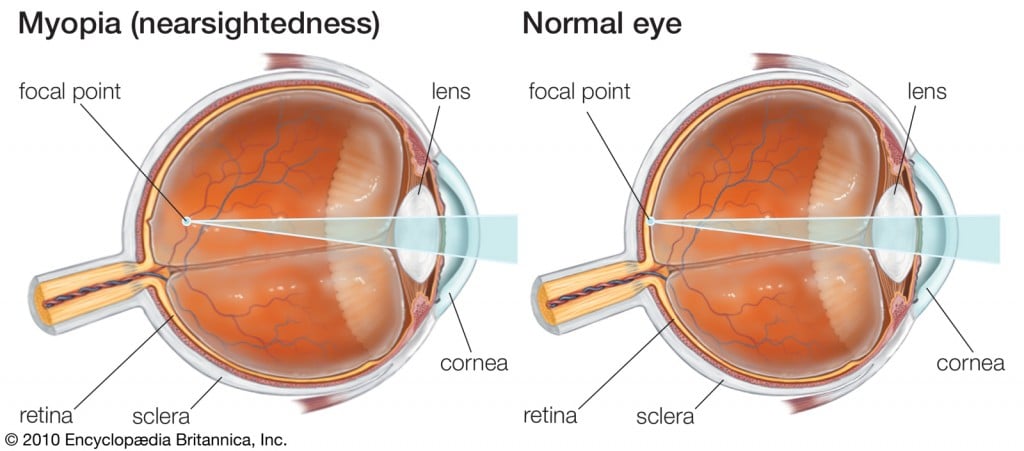Myopia (short sightedness) is an extremely common eye condition that generally allows close objects to be viewed clearly but distant images are blurred. The eye is its own optical system and for it to work perfectly light must enter the eye via the pupil and be focused on the retina. In a myopic (short sighted) eye the focusing system is not perfect and the light is actually focused in front of the retina so by the time the light does actually reach the retinal surface the image is blurred.
Myopic Vision:
Myopia Causes
During childhood, your eyes, along with the rest of the body, grow in size. For the myopic (short sighted) eye, the retina grows further and further away from the point where the light is focused, and so this myopic (short sighted) problem gets worse. This constant lengthening of the eye during childhood is why many of us end up so short sighted. If the rate at which the eye’s length grows could be reduced or stopped, then the myopic (short sighted) increase we so often see in our children could also be reduced.
Should your child require spectacles due to myopia at Bill Opticians we have an exciting range of children’s eye care. All of these are free of charge as they are covered under the NHS voucher scheme.
There have been many studies conducted into myopia (short sightedness) and the evidence certainly seems to suggest that the problem of myopia (short sightedness) in the developed world is on the increase. So why are we becoming more and more myopic (short sighted)? There are a number of theories but as yet none of them is proven. Here are a few of the possible reasons for this increase in myopia (short sightedness).
- Parental Myopia. It is pretty certain that there is a genetic link between myopic (short sighted) parents and their children.
- A natural adaptation to the modern world’s near vision requirements. Much of our education involves a constant need for close work. It is possible that the human eye is naturally evolving in a more myopic (short sighted) way to help cope with all this near vision.
- It is known that a drop in outdoor activity can lead to insufficient levels of Vitamin D which is obtained from sunlight. Could a drop in our Vitamin D be contributing to all this myopic (short sighted) increase?
- It has been suggested that a modern diet may also be contributing to this myopic (short sighted) shift.
As mentioned before these are only theories and are as yet unproven. However, as suggestions, they are both interesting and plausible. What is undisputed is that there is an increase in myopia (short sightedness) and it would be beneficial to those suffering from it if there was a way of reducing the problem.
Myopia Symptoms and Treatment
Chances are the only symptom is that more distant objects are blurred. You may also notice:
- Headaches
- Squinting
- Eye strain
- Eye fatigue when you try to see objects more than a few feet away
- Children with myopia often have trouble reading the blackboard at school
An eye exam at Bill Opticians can show you if you’re myopic. Glasses, contacts, or refractive surgery can usually correct the problem.
When you have myopia, your prescription for glasses or contact lenses will be a negative number. The more negative the number, the stronger your lenses will be. Your prescription helps the eye focus light on your retina. That clears up your vision.
Book an appointment with us today or get in touch for more information about Myopia.

